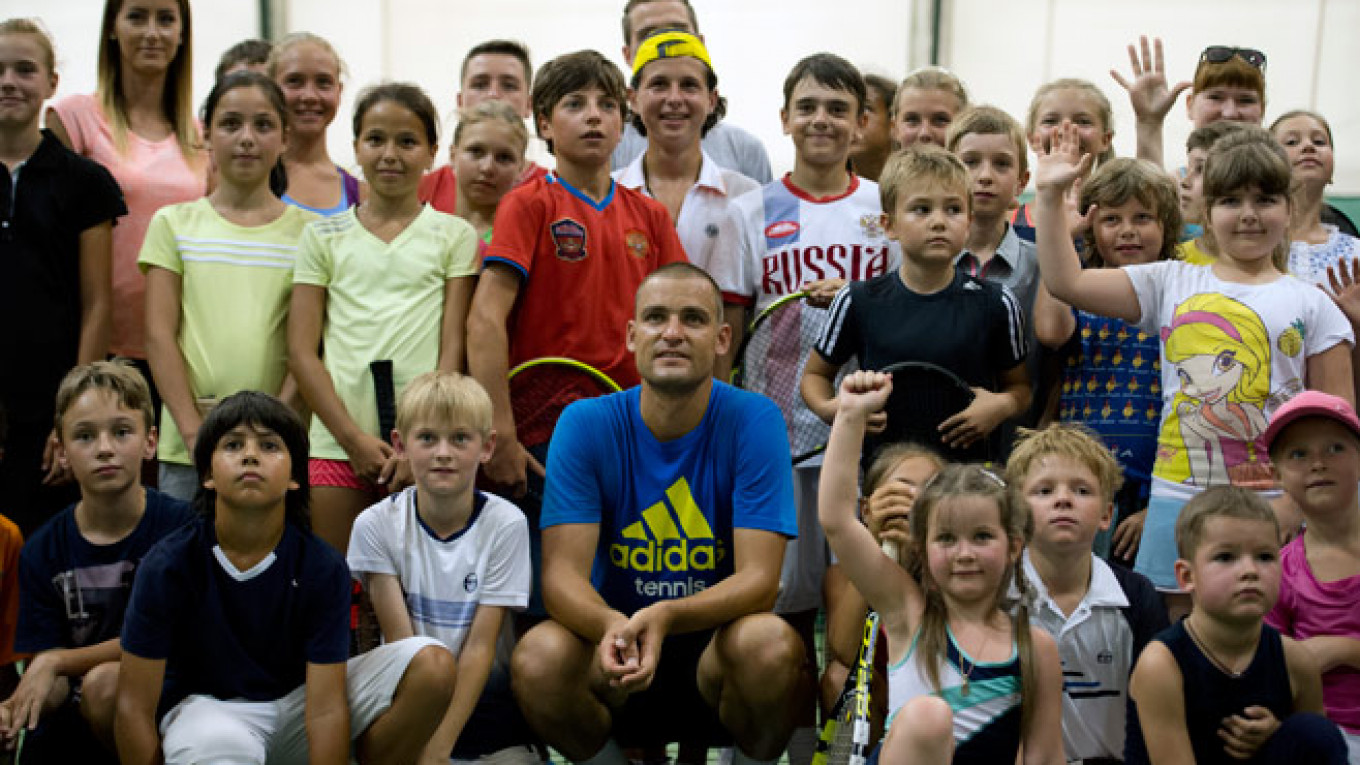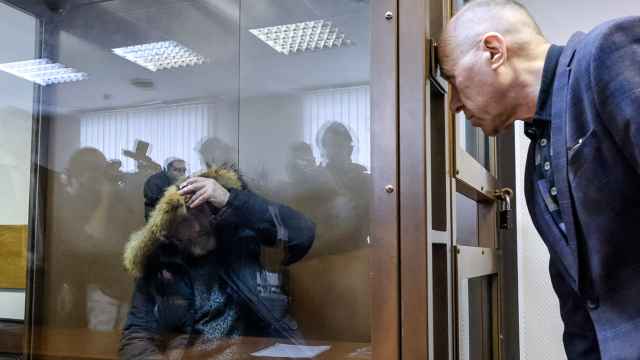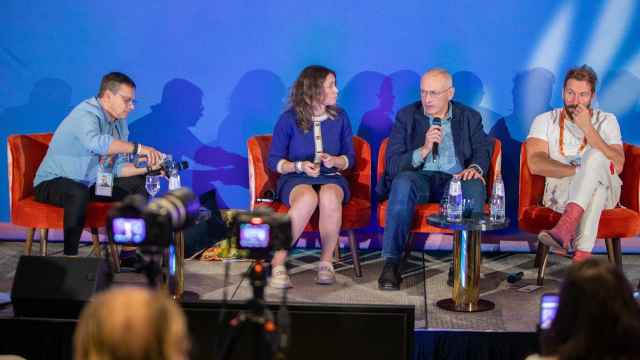The siren songs of top-notch training facilities and balmy weather emanating from such international tennis hot spots as Monaco, Florida and Spain have done little to sway the determination of Russia's finest players to train at home.
Only three of the 10 Russian tennis players currently ranked among the world's top 100 have been trained abroad. The other seven are products of tennis clubs in Moscow and Sochi, including the country's best male player, 23rd-seeded Mikhail Youzhny.
Mikhail Youzhny, currently ranked 23rd in the world, is the highest seeded Russian male tennis player. The star athlete took a break from his busy training schedule to talk to The Moscow Times about the advantages and challenges of training in Russia.
The 32-year old, who's currently training for the next U.S. Open, which starts Aug. 25, ranked as high as eighth in the world in 2008 and 2010, and has reached the semifinals of the U.S. Open twice, as well as the quarterfinals of all four Grand Slams.
Apart from training in Thailand in December to escape Moscow's unforgiving winter, Mother Russia's brightest son prefers to remain at home.
"I don't have any issues with practicing here because I have a Russian tennis coach [Boris Sobkin] and fitness coach [Oleg Mosiakov]," Mikhail Youzhny told The Moscow Times during a recent masterclass hosted by the Russian Tennis Academy. "I have everything I need here in Russia. I don't need to move somewhere else."
In the 1990s and early 2000s, Russia's tennis scene was marked by an exodus of the best and brightest of the country's players. But though this trend has waned in recent years, Russia's tennis success — in the eyes of many fans — remains inextricably bound to Western training.
The country's most successful player, international tennis sweetheart Maria Sharapova, carries a "made in the U.S.A." label. Although she swears fidelity to her Russian roots, represents the country in the international arena and was even a torch bearer at the opening ceremony of the Sochi Olympics in February, Sharapova was turned into a tennis star at the renowned Nick Bollettieri Tennis Academy in Florida, where she began to train at age 9.
Sharapova's fellow Russian players have been known to question her true Russian-ness.
"Russians [Anna] Kournikova, Maria [Sharapova] and Max [Mirnyi] moving to Florida or [Svetlana] Kuznetsova heading to Spain spoke more to the fact that the training and weather were better elsewhere, that even the facilities in Moscow were old and unheated," Mary Carillo, an American tennis analyst and former professional player, told The Moscow Times. "This reality continues to be true in a lot of Eastern European countries, so the gifted athletes seek better opportunities in countries like Spain, France or the U.S."
Despite a relatively low level of grassroots support for the sport and its inaccessibility to large swaths of the population, Russia has succeeded in creating a generation of homemade tennis stars.
Little Access, Little Support
The opulence of the prestigious Russian Tennis Academy, located in the Moscow region, attests to the sport's exclusivity in Russia. Aspiring tennis players parade around in their color-coordinated kits, emulating their Grand Slam heroes.
The little Sharapovas and Youzhnys also ride to practice in style. The facility's parking lot is jam-packed with gleaming Porsches, Audis and BMWs.
Four hours a week of children's tennis lessons at an average tennis academy in Moscow costs 12,000 rubles a month ($340). This amount corresponds to 44 percent of the average Russian's monthly salary, or 22 percent of the average Muscovite's — sums most frequently reserved for the bare essentials.
"It's expensive to practice in Russia," Youzhny said. "Some people go abroad not only because the weather might be better, though sometimes the system they have [abroad] is good for some but not as good for others."
Youzhny, born and raised in Moscow, explains that some of his compatriots choose to leave the country because of the high cost of training and scarcity of coaches. In 2012, the Russian Tennis Federation said there were 1,335 certified coaches for 18,905 tennis players training at official facilities.
There are also considerable costs associated with relocating abroad in hopes of eventually becoming one of the greats. A one-hour private lesson with Nick Bollettieri — the world-famous tennis coach who trained Sharapova, Andre Agassi and Venus and Serena Williams in Florida — costs $900. On average, a training session with a lesser-known coach can cost about $100.
In its development program geared toward 2020, the Russian Tennis Federation noted the population's lack of access to tennis lessons, the insufficient number of tennis facilities in the country and the lack of funding among regional tennis associations as factors hindering the sport's development.
Despite the popularity of a largely inaccessible sport — nearly 3,000 tournaments take place in Russia every year — tennis is not getting as much state support as it needs to ensure increased accessibility and player development, according to Boris Sobkin, who has coached Youzhny since 1993.
"In the Soviet Union, tennis was a sport for rich people, an aristocratic kind of sport," Sobkin said. "Now, the situation is much the same. There's no support at all. Tennis is the responsibility of the parents, of some rich people who want to [support] it, but it's not a national issue."
Last year, the Russian Tennis Federation said its budget was $8 million. The tennis federation of the United States, a country that currently has 11 players in the top 100, boasted a budget of $225 million for the same year. And in China, the tennis federation worked with a $150 million budget.
Bourgeois Sport
Tennis made its debut in Russia in the late 1880s as lawn tennis courts appeared in St. Petersburg and Moscow. The pre-revolutionary era had its own generation of tennis fans, most notably Leo Tolstoy, who devoted an episode to the sport in his famed novel "Anna Karenina."
But after the Revolution of 1917, Russian tennis faced numerous obstacles. According to the Russian Tennis Federation, Soviet authorities considered tennis a "foul-smelling bourgeois sport" and pejoratively referred to it as the "sport of white pants." The development of tennis in Russia was further hindered by the sport's absence from the Olympics until 1988.
"It was really funny because people in the Communist Party and government played tennis," Sobkin said. "But in light of the political atmosphere at the time, it was not our sport. It didn't have the ideological and financial support."
Despite a lack of support for the sport, the Soviet Union produced a handful of talented tennis players. Alexander Metreveli, from the Georgian Soviet republic, made it to the Wimbledon final in 1973. And Olga Morozova won the 1974 French Open with an American doubles partner, Chris Evert, after losing the singles event final to Evert in straight sets.
Yeltsin Years
But the infamous white pants came to replace the hammer and sickle with the ascent of the exuberant Boris Yeltsin to the Russian presidency in 1991. Yeltsin's presidency, vastly remembered as the most turbulent era of Russia's recent history, was afflicted with instability and disorder. But the Yeltsin years left Russia with a more productive legacy: a national passion for tennis.
Yeltsin, a sweatband propping his snowy locks, would practice with tennis coach Shamil Tarpischev in the mornings, releasing the stress of managing a crumbling economy and rebuilding a nation.
The enthusiastic former president attended Russian players' tournaments and dished out advice on improving their serves or sharpening their backhands.
"Boris Nikolayevich [Yelstin] gave tennis lots of support," Sobkin said. "All tennis people have great respect for him. Because of him, tennis became really popular in Russia."
Since the Yeltsin era, Russian players have won 12 Grand Slam titles.
Yeltsin's enthusiasm materialized on and off the court. When a fresh-faced Youzhny won match point in the singles event at the 2002 Davis Cup against France, the ailing politician leaped over a court-side barrier to embrace the victor. Security guards did not interrupt the 71-year-old's glee.
Prospects for Russian Tennis
Despite obstacles in developing a bourgeois sport among a population with limited means and a proletarian history, the prospects of Russian tennis remain bright.
Andrey Rublev, a 16-year-old Muscovite, currently ranks first among the world's junior tennis players. His compatriot Roman Safiullin ranks ninth. Togliatti-native Darya Kasatkina ranks third on the girls' side, while 17-year-old Varvara Flink is 10th.
"Some of these kids here are good," Youzhny said, after hitting with a group of young players at the Russian Tennis Academy. "I see some real talent here."
See also:
Russian Football Commentator Calls for No 2018 World Cup in Russia
Contact the author at [email protected]
A Message from The Moscow Times:
Dear readers,
We are facing unprecedented challenges. Russia's Prosecutor General's Office has designated The Moscow Times as an "undesirable" organization, criminalizing our work and putting our staff at risk of prosecution. This follows our earlier unjust labeling as a "foreign agent."
These actions are direct attempts to silence independent journalism in Russia. The authorities claim our work "discredits the decisions of the Russian leadership." We see things differently: we strive to provide accurate, unbiased reporting on Russia.
We, the journalists of The Moscow Times, refuse to be silenced. But to continue our work, we need your help.
Your support, no matter how small, makes a world of difference. If you can, please support us monthly starting from just $2. It's quick to set up, and every contribution makes a significant impact.
By supporting The Moscow Times, you're defending open, independent journalism in the face of repression. Thank you for standing with us.
Remind me later.






